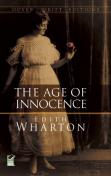BKMT READING GUIDES
The Age of Innocence (Dover Thrift Editions)
by Edith Wharton
Mass Market Paperback : 240 pages
4 clubs reading this now
0 members have read this book
Edith Wharton (1862–1937) wrote carefully structured fiction that probed the psychological and social elements guiding the behavior of her characters. Her portrayals of upper-class New Yorkers were unrivaled. The Age of Innocence, for which Wharton won the Pulitzer Prize in 1920, is one ...
Introduction
Edith Wharton (1862–1937) wrote carefully structured fiction that probed the psychological and social elements guiding the behavior of her characters. Her portrayals of upper-class New Yorkers were unrivaled. The Age of Innocence, for which Wharton won the Pulitzer Prize in 1920, is one of her most memorable novels.
At the heart of the story are three people whose entangled lives are deeply affected by the tyrannical and rigid requirements of high society. Newland Archer, a restrained young attorney, is engaged to the lovely May Welland but falls in love with May's beautiful and unconventional cousin, Countess Ellen Olenska. Despite his fear of a dull marriage to May, Archer goes through with the ceremony — persuaded by his own sense of honor, family, and societal pressures. He continues to see Ellen after the marriage, but his dreams of living a passionate life ultimately cease.
The novel's lucid and penetrating prose style, vivid characterization, and its rendering of the social history of an era have long made it a favorite with readers and critics alike.
Editorial Review
Somewhere in this book, Wharton observes that clever liars always come up with good stories to back up their fabrications, but that really clever liars don't bother to explain anything at all. This is the kind of insight that makes The Age of Innocence so indispensable. Wharton's story of the upper classes of Old New York, and Newland Archer's impossible love for the disgraced Countess Olenska, is a perfectly wrought book about an era when upper-class culture in this country was still a mixture of American and European extracts, and when "society" had rules as rigid as any in history.Discussion Questions
No discussion questions at this time.Book Club Recommendations
Recommended to book clubs by 0 of 0 members.
Book Club HQ to over 90,000+ book clubs and ready to welcome yours.
Get free weekly updates on top club picks, book giveaways, author events and more








